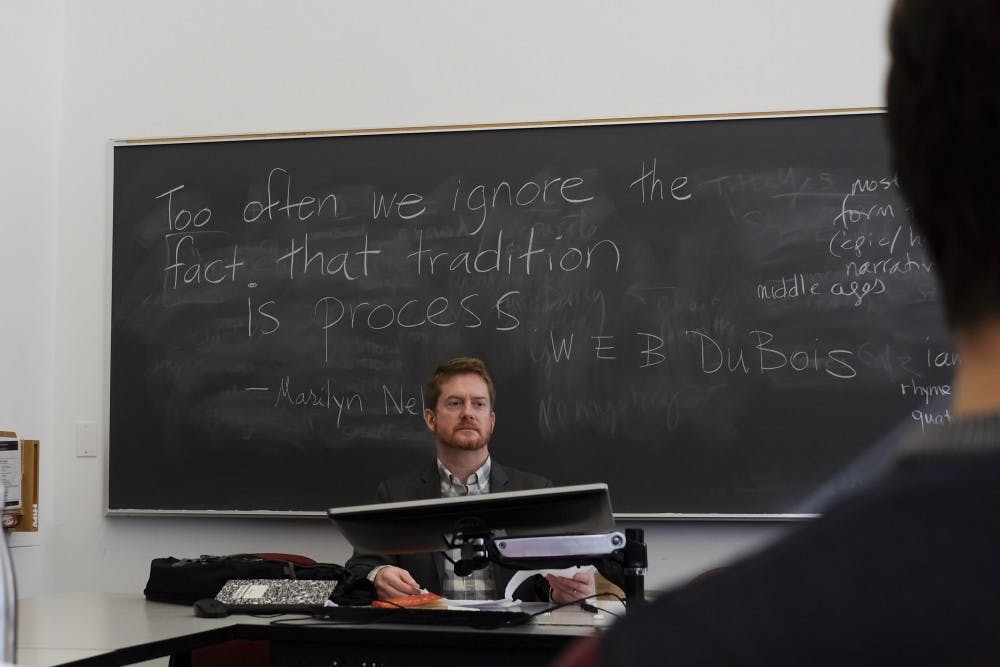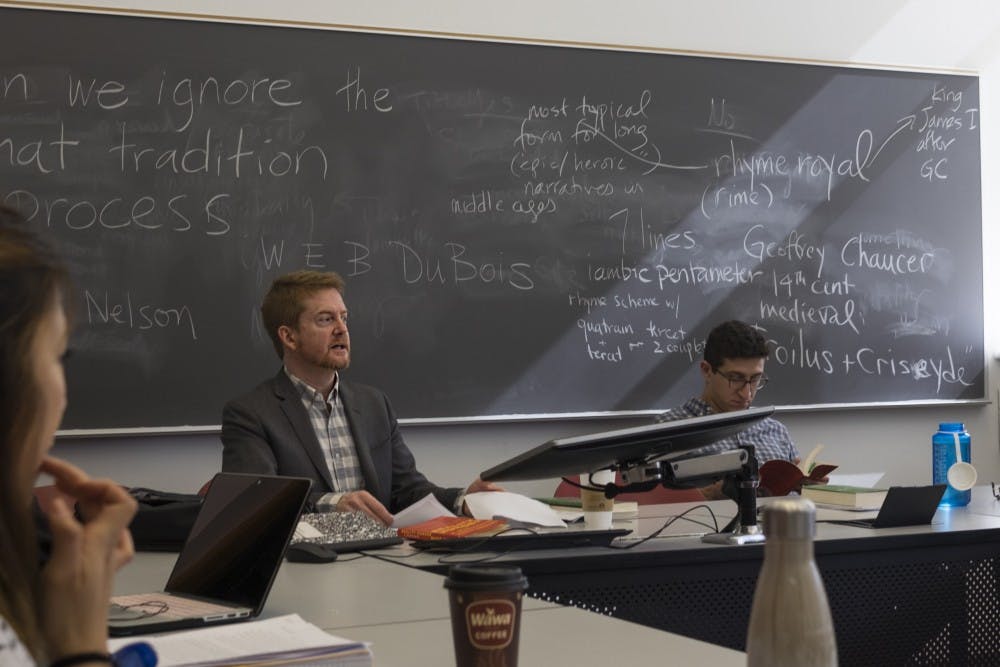Jay Kirk has taught courses in experimental and creative nonfiction at Penn for 13 years and was recently awarded a $40,000 grant from the Whiting Foundation to conduct research and write his next book.
“Experimental” is the philosophy that informs Jay Kirk's approach to writing and life, and what he encourages his students to live by as well.
Jay Kirk never intended to teach. But 13 years ago, Penn was looking for an instructor to teach nonfiction and he ended up coming to campus once a week to run classes on experimental and creative nonfiction. Reflecting on teaching, Jay says, “it has had a huge influence on me” and adds, “by having to come in once a week and articulate my thoughts about writing, it has made me interrogate exactly what it is I am doing.”
This semester, he comes to Penn every Tuesday to run his class on experimental nonfiction (listed as ENGL 145). His class runs, like most other creative writing classes, in a workshop style, where students share their work and participate in group critiques. “The most important thing is that we are working on the students’ writing.” He says that critiques work since “everyone is always at a different place” and are developing their “own voice.”
An integral part of Kirk’s class is the idea that writers of experimental nonfiction should “go out into the world and have some kind of experience.” This could involve profiling somebody, or conducting a sociological experiment. Students’ writing projects have ranged from visiting inmates in prisons to busking in Philadelphia, from bear hunting to tagging along with taxi drivers.
“Experimental nonfiction” can defy definition. “Nonfiction” refers to facts—it is a genre unwaveringly dedicated to truth and accuracy. How do you “experiment” with that? Doesn’t any attempt to experiment and tinker around with the real and factual affect the truth?
Evidently Jay has thought about this. “Nonfiction is still nonfiction, so it still has to be about facts. Some people who have done experimental nonfiction before say that they try to blur fiction and nonfiction, but to me that’s just fiction. I believe more in blurring the subjective and the objective.” You can’t invent things, but in experimental nonfiction, you can “set things in motion” and “make things happen.” As Jay says, “you write yourself into the world.”
Jay recognizes the contentions surrounding the practice of experimental nonfiction, including the debate about experimental nonfiction’s “artifice.” He shrugs, acknowledging that any piece of art could be guilty of “artifice.” In a way, experimental nonfiction embraces artifice, as it is a “very self–conscious process” in which the writer continually “interrogates the form.”

A writer of experimental nonfiction continually asks: How does a story work? How do you experience something? How do you report on that? The form constantly “questions sincerity for the sake of authenticity.”
Talking about creative nonfiction, Jay says, “It’s more fun. It encourages me to take chances and risks and gambles, with combining events and lines of thought.” He lightheartedly shares about how he once filmed a horror flick, guerilla–style, on a “high end, ecotourist cruise ship," right under the nose of the crew and all the passengers, and barely anyone noticed. He loves watching how people react to the unexpected.
His enthusiasm grows as he starts talking about XFic, a new journal of experimental nonfiction, that will launch at Penn next year. XFic’s mission is to provide students a new platform to publish their work and be recognized for their creativity.
On the days he isn’t at Penn (AKA the days that aren't Tuesday), Jay writes. And rewrites. “All writing is revision,” he laughs, “it’s a cliche, but it’s true.” It’s easiest for him to write in the morning, before he needs to think about anything else.
Right now, he's working on the book for which he received the Whiting Foundation grant. Called Avoid the Day, the book is part grief memoir, part detective story, part philosophical meditation. The Whiting Grant jury, described his story as a “thrilling, eccentric journey through time and space, art and music” and a “courageous experiment in hyper–subjectivity.” The jury’s statement ends by saying this is "writing that pushes the boundaries of what nonfiction can do.”
Avoid the Day is based on a journey Jay took to Transylvania and the Arctic Circle, following in the footsteps of an avant–garde 20th–century Hungarian composer, Béla Bartók. Bartók had spent time in the countryside collecting folk songs, which he later fused with Western music.
What Jay is working on usually informs what books and art he consumes. Right now, he’s immersing himself as much as possible on the subject of his new book. He’s been reading quite a bit of Greek mythology (including Penn professor Emily Wilson’s translation of the Odyssey), listening to a lot of “crazy 20th century atonal music” and watching more horror movies than he “thought [he] could ever watch.”
When asked about resources he recommends for those interested in writing and literature, he immediately recommends the Penn Book Center. He calls it an “amazing bookstore”—in case you didn’t already know, the Penn Book Center doesn’t just sell books, but also hosts many writers’ events and readings.
On a final note, he also gives some advice for students who want to pursue writing seriously, “Take advantage of all the stories that are surrounding you. The best stories are already right underneath your nose.”
He pauses. “And read. Endlessly.”

